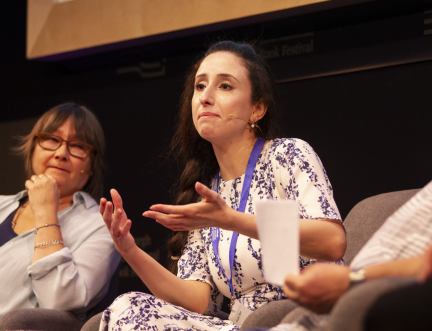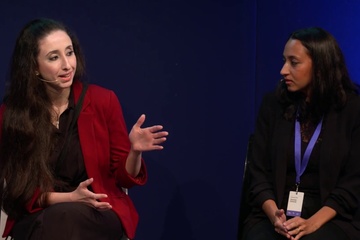More articles Tuesday 13 August 2019 8:10pm
“Suffering and revolution is a collective experience. If I rebel, then we exist,” Palestinian writer Nayrouz Qarmout

“If I rebel, then we exist,” said Nayrouz Qarmout today at the Edinburgh International Book Festival in conversation with singer-songwriter Karine Polwart, Ali Smith and Guest Selector Val McDermid. Speaking through a translator, the Palestinian writer discussed important notions of identity and displacement at an event exploring the meaning of home for migrants and refugees.
“Suffering and revolution is a collective experience,” she said. “If I rebel, then we exist. I believe creation is a revolution. Palestinian identity needs this revolution. Then I believe this creativity and revolution is a woman.”
The Sea Cloak, Qarmout’s newly released collection of short stories, draws from her own life in the Gaza strip and her childhood in a refugee camp in Syria.
“I want to offer a balanced view of Palestinians in this age. I want to present writing away from the view of the Nakba” – the day Israel commemorates as their independence day – “and to offer the book as a human and an artist,” she explained. “I’m not talking about heroics and heroes, but to confess some faults and flaws [which] will be beginning of victory.
“Sometimes I feel weak but this makes me feel stronger later. And then I go back and think what it’s like to be a prisoner in my country. As a child, as a woman, as a man, how they once again can build a life that’s already wrecked. It’s fertile ground for me to write a lot.”
“So come to Gaza,” she joked in English. “You will write more.”
The process of telling stories was also discussed by folk singer Karine Polwart, whose song ‘Maybe There’s a Road’ was written about a true case of human trafficking in Midlothian. “You can tell a story in very condensed form, which is what folk song is. But often all I want to tell is one scene from a movie, just one scene, where we can all do the work for ourselves about what happened before and what happens after […] So they’re like little postcards or snapshots and they’re meant to be evocative. And the most that I can do to tell a bigger story is place them alongside each other.”
Renowned author Ali Smith spoke of the latest volume of Refugee Tales, an anthology of stories about asylum and detention, of which Smith is patron. “Finally we are getting the actual voice of people who are telling their own story… People who are actually speaking for themselves. This is the whole point.
“The motivation to express ourselves is at the basis of us all. It’s why we’re so romantic about the notion of home, it can’t not be romantic to us because it’s everything to us. It’s what makes us, it’s who we are and we tell that story to everybody and everybody tells that story to us, that’s how they understand human beings. So for the third volume of Refugee Tales, to have people who are not masked anymore, who are telling for themselves… that’s the best.
“Roughly 30,000 [people] in the immigration removal centres in this country keep the industry going, because basically those immigration removal centres are private concerns, run by private security companies for the government... They do things I had never imagined happening in this country.”
The controversy surrounding the 300 asylum seekers currently facing eviction from Serco housing in Glasgow was raised, with Qarmout expressing disappointment that there was a need for emergency shelter in Scotland.
“It’s a powerful country and the people are warm. There shouldn’t be anyone out on the streets in the cold. Every person in Scotland should have a home and as a Palestinian I know what it means to be without one.”


 Major new partnership with Celtic Connections
Major new partnership with Celtic Connections 

